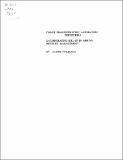Incorporating sell-up in airline revenue management
Author(s)
Charania Aamer
DownloadFTL_R_1998_05.pdf (7.597Mb)
Other Contributors
Massachusetts Institute of Technology. Flight Transportation Laboratory
Metadata
Show full item recordAbstract
The decision to buy a fare that is higher than the desired fare, under the situation when the desired fare is not available, is known as sell-up. Passengers' willingness to sellup can have considerable impact on airline revenues. The extent of this impact is dependent upon the method used to control booking limits and other parameters associated with passenger demand and fare structure. In this thesis we demonstrate the importance of incorporating sell-up in airline revenue management. The improvement in revenue, under various scenarios, and under various seat inventory control algorithms, is discussed. We also analyze the influence of demand factor, spill, sell-up rate and fare ratio on these improvements. A modification of the EMSRb heuristic is proposed to capture the revenue potential associated with passenger sell-up. The proposed rule increases the protection levels, obtained from the EMSRb algorithm, as long as the expected gain, from every additional seat protected, is greater than the expected loss. Unlike the existing models, the proposed rule uses expected spill to determine the expected number of passengers that would sell-up at a given demand level and sell-up rate, and then adjusts the protection levels accordingly. This makes it robust to variations in demand levels. We have also developed a simulation to compare the performance of the existing rules with that of the proposed heuristic. The simulation has the ability to account for errors in sell-up estimation and variability in demands. It is shown that the revenue gains under the proposed rule may not exist under all situations. In the tests performed in this thesis, the improvements over the original EMSRb algorithm vary from 0% to over 2.5%. Although the gains are not consistent, the proposed rule does not cause any negative impact on overall revenues and hence is unlikely to pose any risk when implemented over the original EMSRb algorithm.
Description
Includes bibliographical references
Date issued
1998Publisher
[Cambridge, Mass. : Massachusetts Institute of Technology], Flight Transportation Laboratory, [1998]
Other identifiers
663476807
Series/Report no.
FTL report (Massachusetts Institute of Technology. Flight Transportation Laboratory) ; R98-5
Keywords
Airlines, Revenue management, Management